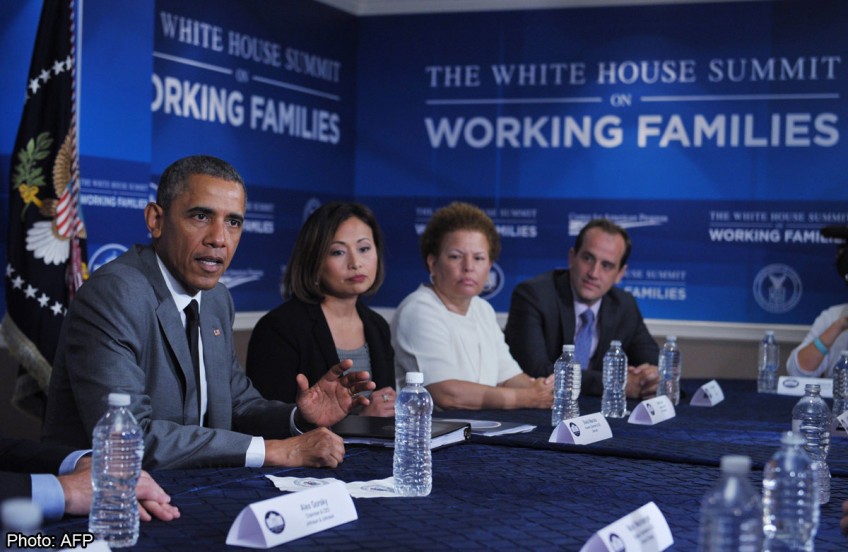A look at maternity benefits in 5 countries

United States President Barack Obama said on Monday that the United States was on its "lonesome" as the only developed nation not to offer paid maternity leave, in a report by AFP.
Mr Obama headlined a "Working Families Summit" in Washington and flexed his presidential powers to direct government agencies to adopt more flexible workplace practices to allow parents to manage home and professional commitments.
"If France can figure this out, we can figure it out," Mr Obama said. He called on lawmakers to pass the Pregnant Workers Fairness Act, which requires employers to provide reasonable workplace flexibility for pregnant women who stay on the job close to their due dates.
We look at how five other developed countries in the world fare in terms of maternity benefits.
France
Mothers can take up to 16 weeks of paid maternity leave for the first two children and 26 weeks for the third child. At the end of the maternity leave, the mother or father can take parental leave, or opt to work part-time till the child reaches the age of three. Women are guaranteed full-time jobs when they choose to return. Maternity leave, both prenatally and postnatally, is mandatory
Weeks after giving birth, French women are offered a state-paid course to help them start having sex again as soon as possible. Other freebies include a personal trainer and computer games that help them exercise.This is in addition to other perks such as free nursery schools, tax deductions for each child and generous family allowances.
Sweden
In 1974, Sweden became the first country to replace maternity leave with parental leave, which covers maternity, paternity and adoption leave. Parents are entitled to 480 days of parent leave for each child. Parents who have twins are entitled to an additional 180 days and are encouraged to split these days equally between them. If this is done, they will be entitled to an additional equality bonus. At least 60 days of the parental leave must be claimed by fathers.
All legal Swedish residents are entitled to the basic parental leave payment of 180 Swedish kroner (S$33) a day. Working parents can continue to receive 80 per cent of their salary while on leave. In the Scandinavian countries, it is written into law that women have the right to return to their jobs on a part-time or full-time basis after maternity leave.
Switzerland
All women workers in Switzerland qualify for a minimum of 14 weeks of maternity leave. Both full-time and part-time workers are paid 80 per cent of their normal salary, or up to 196 Swiss francs (S$274) a day. The individual cantons may provide additional benefits. For instance, in the Canton of Geneva, maternity leave lasts for up to 16 weeks.
Paternity leave is not governed by the legislation and is left to the discretion of the father's employer. Swiss companies grant new fathers on average between two and five days of paid leave.
Japan
Paid maternity leave in Japan covers a total period of 14 weeks at two thirds of the monthly salary. Mothers are not allowed to return to the workplace within the first eight weeks following childbirth, although under a doctor's approval, she may return after six weeks.
Low-income families earning less than 7.8 million yen (S$120,900) a year receive 5,000 yen (S$77.50) each for the first and second child and 10,000 yen (S$155) for the third child until their children complete the third year of primary school. Local authorities offer additional incentives.
Prime Minister Shinzo Abe wants men to take time off after their children are born, under a campaign dubbed the Ikumen Project, which translates as men raising children. The goals is to raise the percentage of men taking paternity leave from 1.9 per cent in 2012 to 13 per cent by 2020.
South Korea
In South Korea, working mothers are entitled to three months of maternity leave - the first two with full pay and the third month capped at 1.35 million won (S$1654). Following childbirth, mothers can opt for unpaid leave of up to a year.
In 2009, flexi-work arrangements were introduced for women. Bosses must give paternity leave of three days, in what is seen as a big move in a country where cultural attitudes dictate that children are a mother's concern.

This article was first published on June 24, 2014.
Get a copy of The Straits Times or go to straitstimes.com for more stories.